|
Dennis Bunnel In PA Hall Of Fame
By Jill Ercolino / Managing Editor PA Township News
Reprinted with permission of the PA Township News, the official magazine of the PA State Association of Township Supervisors.
“Time flies when you’re doing something you love”, says Dennis Bunnel, who’s been serving Jessup Township in Susquehanna County for nearly 50 years.
Dennis Bunnel has a constant companion: his cell phone.
“I sleep with it,” says the nine-term supervisor for Jessup Township, Susquehanna County. “I never shut it off. I figure if a resident is going to call me at 2 a.m., it’s because they really need help.
“It’s a supervisor’s job to protect the health, safety, and welfare of the residents,” he adds, “and I live that.”
Bunnel pauses for a minute, and his thoughts turn to his family.
He mentions that for 47 of the 49 years that he’s been a supervisor, he’s also been the township’s roadmaster, two jobs that have consumed most of his time and attention. If he wasn’t at a meeting, Bunnel was plowing or maintaining the township’s roads or taking care of other municipal business.
“They’ve put up with a lot,” he says. “The township always came first.”
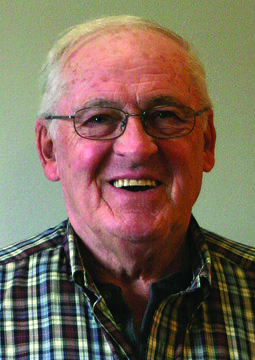
After nearly five decades as a supervisor for Jessup Township in Susquehanna County, Dennis Bunnel says he still loves working with people. Being a supervisor isn’t a job, he says - it’s a life.
Bunnel’s dedication hasn’t gone unnoticed.
Carl Hagstrom moved to Jessup Township in 1982, and for the past decade, has been a regular at the supervisors’ meetings. He became so interested in local government, in fact, that he began subscribing to the Township News.
“I saw the Hall of Fame feature and all of the good things other supervisors were doing, and I thought, Why not Jessup Township? Why not Denny?”
Building respect, widening roads
It was 1969, and Bunnel was a young man when first elected.
His father had been the township’s secretary for many years so the new supervisor understood the ins and outs of local government. He ran for office because he thought he could make a difference in this small, rural community of 500.
And he has.
On the board, Bunnel worked to replace contention with respect. “There had always been issues between the three township supervisors,” he says, “but I felt that for the good of the township, we needed to work together.
“Sure, there are going to be disagreements, but you have to be able to work through them. That’s the key, and that’s what we do.”
Bunnel also turned his attention to the township’s dirt and gravel roads, 35 miles of which snake through the community.
“Back then, our roads were horrendous,” he recalls, adding that the narrow passageways could barely accommodate a single car. “We’ve widened them now to the point where two tractortrailers can pass with no problem.”
Along the way, the township acquired an old schoolhouse and some adjacent land, which it converted into a municipal complex with meeting space for the supervisors and community groups, a garage, and the latest additions: a park, pavilion, playground, and walking trails.
Bunnel says the park and other recent improvements were possible because of the local impact fee assessed on natural gas drillers in the Marcellus Shale and shared with communities statewide. Jessup Township, home to a number of wells, has become a hub for production.
“Before the impact fee, we were just broke,” he says, “but now we’ve been able to update our equipment and our buildings. We’re debt-free and even have some money in the bank. It’s been a blessing.”
Carl Hagstrom believes that Bunnel himself has been a blessing. The supervisor is always there when the community needs him, the resident says.
“Last year, we had awful storms blow through the township,” Hagstrom says, “and trees were down everywhere. Denny and his crew started cleaning things up late that afternoon and were there until 11 a.m. the next day.
“He’s in his 60s so that gives you an idea of what his dedication is like. This is a man who has given everything he’s got to his community for almost 50 years. What might crush you or me, well, that’s what keeps him going.”
Humble to the core, Bunnel says that taking care of the township is a team effort.
“I’m surrounded by fantastic people, and our residents know if there’s a problem, we’re there,” the supervisor says. “Yes, I’ve been in office 49 years, but it doesn’t seem like it’s been that long because I love people, and I love working with people.
“This isn’t a job; it’s my life” Bunnel adds, “and I’m happy to say that we get more compliments than complaints.”
How PSATS has helped this Hall of Famer Dennis Bunnel may have been a township supervisor for nearly 50 years, but that doesn’t mean he has stopped learning - or asking questions. He says that when a perplexing issue arises, he turns immediately to PSATS. “They are always there when you need them, and I call them quite often,” he says. “They’re knowledgeable, and you can trust their answers.” Note: If your township needs help with a local government related matter, call PSATS at (717) 763-0930. You can also find a list of staff email addresses at www.psats.org. (Click on the “About Us” tab and choose “PSATS Staff.”)
Back to Top
Residents Get Their Green On
Submitted By Kim Grace
Penn State Master Gardeners Amy Lyons-Boot, Janet Gere, Gayle O’Brien and her husband, Pat helped 8 residents at Gracious Living Estates in South Montrose recently ‘get their green on’ by planting Shamrock plants.
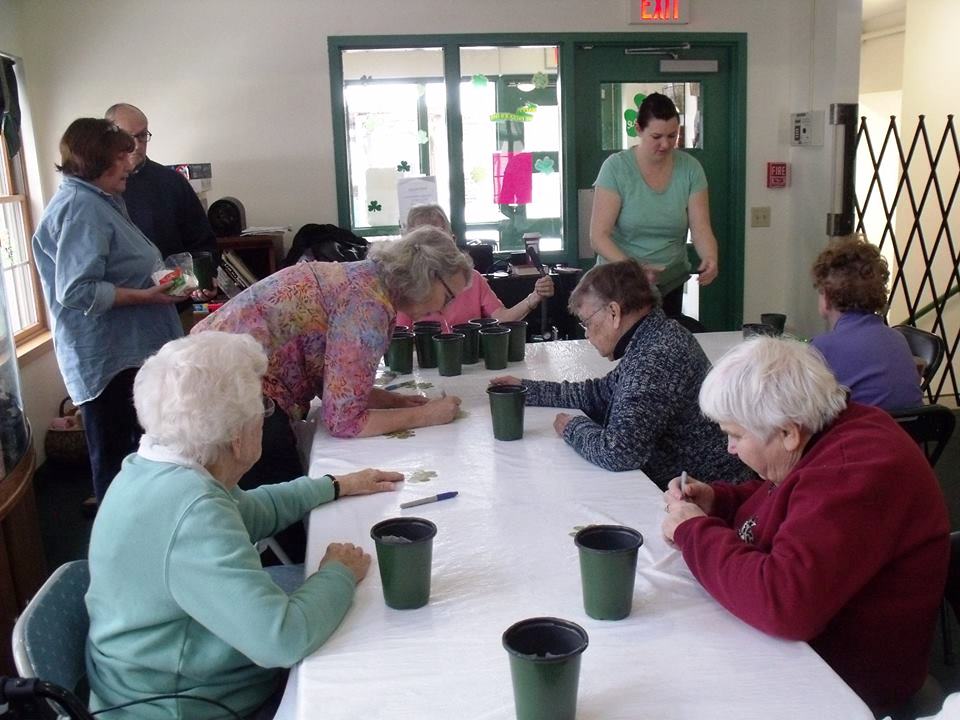
Master Gardeners assist Gracious Living residents in planting Shamrocks into pots.
“We had a lot of fun with the residents, many of whom had said they had Shamrocks plants before… and one woman even told a story of how she had a Shamrock plant planted outside when she lived in Florida!”, said Master Gardener Senior Center Coordinator Amy Lyons-Boot.
Back to Top
The One More Gallon Challenge
Submitted by Susquehanna County Alternate Dairy Princess, Dana Nunemacher
In the past few weeks, dairy farmers across the United States have felt the pressure as milk prices have continued to drop. I think this is such an important topic to discuss, as agriculture is Pennsylvania’s leading industry, the path to number one being paved by dairy farmers.
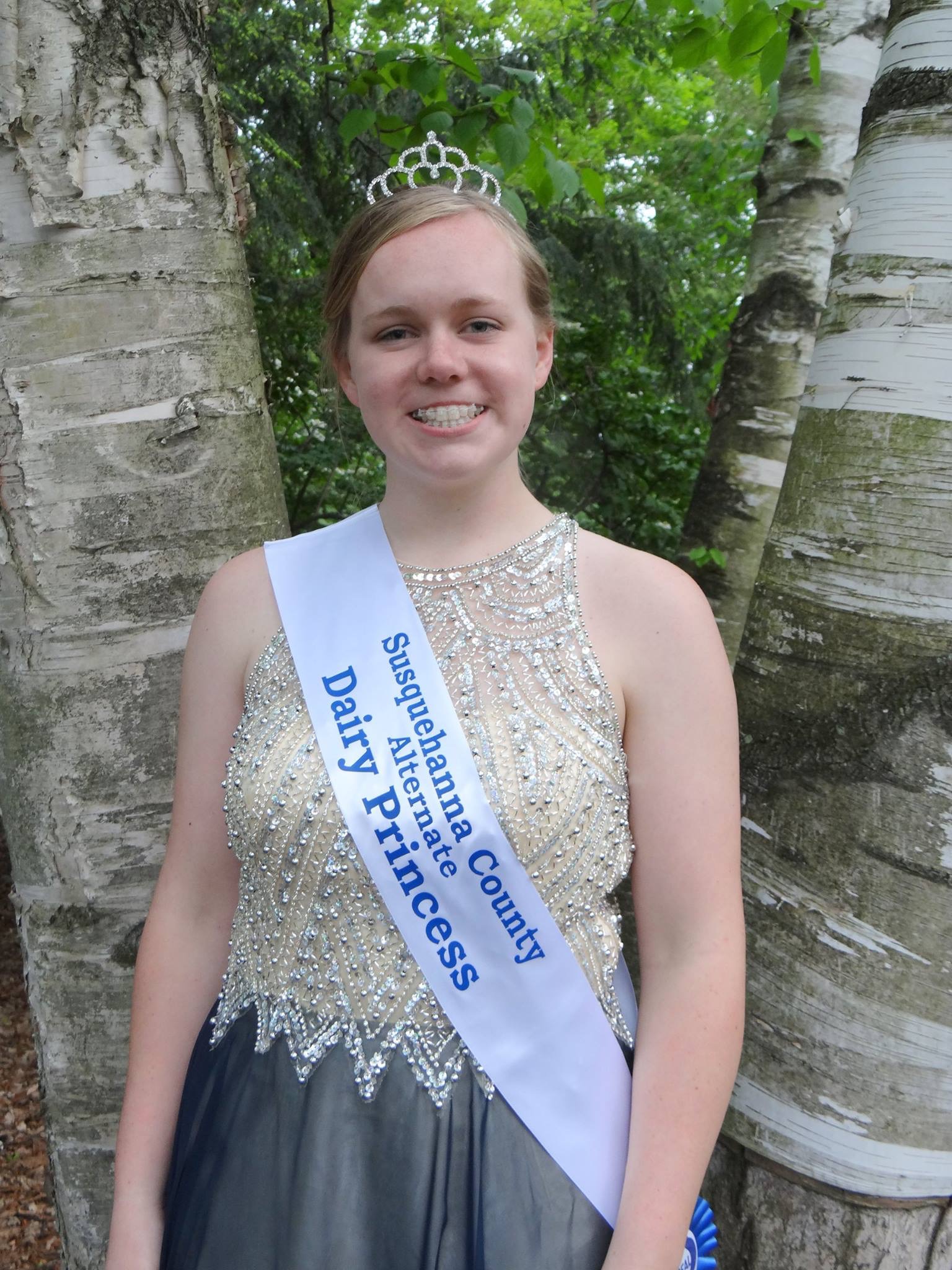
Dana Nunemacher
First, I would like to share some important information. How exactly is a dairy farmer paid? To put into perspective how much milk prices have changed, farmers were being paid an average $24.00 per hundred pounds of milk in 2014. This price was the highest recorded in Pennsylvania! In 2018, the price has fallen to around $14.00 per hundred pounds of milk. That $10.00 difference begins to add up and, yes, it does turn out to make a negative impact on farms. The last place farmers’ money goes is in the farmers' pocket for their own personal spending. Feed must be paid for. Bedding must be paid for. Equipment must be paid for. In fact, everything on a dairy farm comes with a price tag.
To those out there who do not live on a farm, this may not seem like relevant news in your daily lives. Maybe some don’t quite grasp the day in and day out flow of a dairy farm. That is okay. Just like some out there, I did not grow up on a dairy farm. My family and I spent several years raising dairy calves then sending them out to other local farms for milking. I do not know what it is like to get up at the crack of dawn every morning and work late into the night. I do not know what it’s like missing a family celebration or a holiday. However, I do know what it is like to wake up every morning knowing you have animals who count on you. I know what it is like to feel the pride of having your own farm, big or small, milking or non-milking.
What can you do to help? One great option is to join the “One More Gallon Challenge”! This recent trend was created by dairy farmers using popular social media platforms, such as Facebook. The trend urges consumers to buy just one more gallon of milk, one more container of yogurt, or even one more container of ice cream. Maybe you’re thinking that there is no way that your family can consume that much dairy. That’s okay! Take your “one more gallon” or other dairy item and donate it to a local food bank. In this way, you are supporting your community in more than just one way. In order to know that you are supporting your local Pennsylvania Dairy Farmers, be sure to check your dairy products for the PA Preferred check mark or see if there is a local Pennsylvania address. This will ensure that Pennsylvania dairy families will benefit from your purchase.
Thank you in advance if you choose to participate in this challenge! If not, thank you for taking the time to read this article and learn about the struggle farmers are facing right now.
To every farmer across the nation, I thank you for your hard work in feeding the world. It is not easy, but I can promise dairy promotion teams everywhere, just like the dairy promotion team here in Susquehanna County, are working hard to promote your safe and moo-licious dairy products. You are not alone in this fight.
Back to Top
Growing Perennials Throughout the Seasons
Submitted By Kim Grace
Would you like to start growing perennials, or add more perennials to your garden? Then join Master Gardener Rose Marie Barnhart for her ‘Perennials Through the Season’ program at the Montrose Bible Conference’s Dryer Hall! This class will provide color photos and information on over 100 perennials grown by the instructor right here in Susquehanna County.
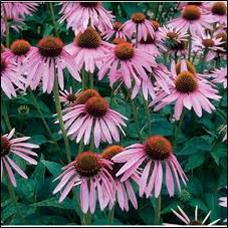
This year, they are looking for new host families in Pennsylvania. Fresh Air host families simply want to share what they have with New York City children and introduce them to the joys of suburban or country life. Fresh Air host parent Maura said, “You go into it thinking about what you can give back, but what you get out of it is so far beyond what you can even imagine. Everyone discovers new perspectives.”
Families who participate in The Fresh Air Fund’s Friendly Towns Program open their hearts and homes to New York City children for one week in the summer. Fatima Shama, Executive Director said, “When I speak with the many people whose lives have been impacted by The Fresh Air Fund, I am energized by the inspiring stories that our children, alumni and their families share with us. They tell us heartfelt stories of their Fresh Air summers that highlight the magic in our work of introducing children to new environments, new people, and new experiences. What we do is simple, yet transformative.”
First time Fresh Air children are boys and girls, from seven to 12 years old, who live in New York City. Children who are reinvited by host families may continue with The Fresh Air Fund through age 18 and can enjoy extended trips.
The Fresh Air Fund, an independent, not-for-profit organization, has provided free summer experiences to more than 1.8 million New York City children since 1877.
For more information about hosting this summer, please call Kavita Shah at 800-367-0003 or visit The Fresh Air Fund online atwww.freshair.org.
Back to Top
Make Tomato Cages And Low Tunnels
Submitted By Kim Grace
Join Penn State Master Gardeners Jim Kasten, George Schreck and Lori Wallace once again for the ever-popular ‘Tomato Cage and Low Tunnels’ program on Saturday, April 14th (rain or shine) from 10:00 am till 1:30 pm at Salt Springs State Park. The program is being held in the Carriage Barn by Wheaton House & historic kitchen garden.
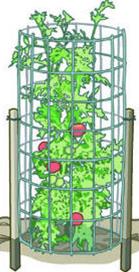
A Stundy Tomato Cage
Once again these two heavily requested classes are back. Tired of those flimsy cages you buy at the box stores? Want something better? Make your own extremely sturdy tomato cages that will last for years. At 10am, the first session will begin with a short lecture with tips for growing tomatoes, cucumbers and pole beans. Then the fun will begin as each student makes their own cages out of concrete reinforcement wire. Each cage is approximately 5 feet tall by 2 feet round. Be sure to bring a vehicle that they will fit in. The cost of material for each cage is $5.00.
Immediately following the first class the second session will begin. First we will explain how to extend your growing season by using a variety of methods. In this hands-on experience, you will then learn how to bend each of your 10 foot long EMT pipes into hoops. The maximum space between hoops should be 30 inches; how many you need depends on the length of your garden bed or beds. Each person will be given the opportunity to bend their own hoops on a bending jig. The hoop is approximately 4 ft. wide and 4 ft. tall and the cost for each 10 foot pipe (hoop) will be $3.50. You also have the option to just come and listen to the discussions and gather a few tips without purchasing hoops or cages.
To register visit: Montrose Adult School www.montroseadultschool.org. Click the Classes link. You can print out a registration form under the HOW TO REGISTER section. To see what classes are offered, click Nature and Country Living to see the Master Gardener classes. Simply mail the form to the Montrose Area Adult School. For more information or help registering call Penn State Extension Office at 570.666.9003 or email: susquehannamg@psu.edu.
Back to Top
Artists Meeting
The Hill Country Artists announce that their monthly meeting will be Thursday evening, April 5.
Gary Snyder wrote, “Nature is not a place to visit. It is home.” The program this month will stress nature and feature a demonstration and presentation of encaustic painting by Sonji Lee. A relatively new member of the Hill Country Artists, she explains that after many years in academia, she found her true passion - creating art. Although some of her works are paintings in two dimensions, many others, with the inclusion of “treasured” objects, expand into the third dimension. These treasured objects are gathered mostly from nature, such as plant materials, items from the earth, and occasionally even deer antlers. Other works by Sonji, however, show reclaimed and re-purposed items, such as saw blades, cut nails, and occasionally, rusted metals. One of her favorite materials is the hive paper from the white-faced hornet. She and friends gather the abandoned hives just prior to the bitter cold of winter and before storms destroy them and gently bring them into her studio for display and use.
Thursday night she will explain and demonstrate how she first became interested in encaustics, which involve the use of paints made from pigments mixed with melted bees wax and resins that then are fused by heating. In her presentation, she will discuss the renewed interest in encaustics, a little background on the medium and provide a short demonstration of the painting technique. This method of painting allows for many mixed-media opportunities such as the incorporation of watercolors, inks, pastels, paper, and a wide assortment of items from nature.
The Hill Country Artists focus on education and training toward encouraging and enhancing artistic endeavors. All meetings are open to the public, and anyone with an appreciation of the arts is urged to attend. The Hill Country Artists always welcome new members. Meetings customarily are in the community room of the Claverack building, east of Montrose on Route 706, starting at 7 PM. Questions? Please contact Sonji Lee at 570-278-5088.
Back to Top
County Courthouse Closing
The Susquehanna County Commissioners announce the Courthouse will be closed on Friday, March 30, 2018, in observance of Good Friday. All court related offices will be available.”
Back to Top
USDA NRCS Offers CSP Renewal Options
Submitted By Bob Wagner
Agricultural producers wanting to enhance current conservation efforts are encouraged to renew their Conservation Stewardship Program (CSP) contract. Program participants with existing CSP contracts expiring on Dec. 31, 2018 can access the benefits of the recent program changes through an option to renew their contracts for an additional five years, if they agree to adopt additional activities to achieve higher levels of conservation on their lands.
Through CSP, agricultural producers and forest landowners earn payments for actively managing, maintaining and expanding conservation activities like cover crops, ecologically-based pest management, riparian buffers, and pollinator and beneficial insect habitat – all while maintaining active agriculture production on their land. CSP also encourages the adoption of cutting-edge technologies and new management techniques such as precision agriculture applications and on-site carbon storage and planting for high carbon sequestration rate.
Some of these benefits of CSP include: Improved cattle gains per acre; Increased crop yields; Decreased inputs; Wildlife population improvements; and Better resilience to weather extremes.
The Natural Resources Conservation Service (NRCS) recently made several updates to the program to help producers better evaluate their conservation options and the benefits to their operations and natural resources. New methods and software for evaluating applications help producers see up front why they are or are not meeting stewardship thresholds, and allow them to pick practices and enhancements that work for their conservation objectives. These tools also enable producers to see potential payment scenarios for conservation early in the process.
Applications to renew expiring contracts are due by April 13. NRCS will mail contract renewal notification letters to all participants whose contracts expire in 2018, which will contain instructions on how to apply for renewal.
USDA’s Natural Resources Conservation Service (NRCS) helps private landowners build their business while implementing conservation practices that help ensure the sustainability of their entire operation.
Producers interested in CSP are recommended to contact their local USDA service center or visit susquehannamg@psu.edu.
Local USDA Service centers in Northeast Pennsylvania include:
Montrose Service Center (serves Susquehanna County) 17089 State Route 706, STE 3 Montrose, Pa 18801. (570) 278-1197 ext. 103 (Attn: AIN WELMON – District Conservationist).
Back to Top
USDA To Measure N.E. Milk Production
Thousands of milk producers across the country, including nearly 2,500 in the Northeast, will receive surveys from the U.S. Department of Agriculture’s National Agricultural Statistics Service (NASS) as the agency collects information for the 2018 Milk Production reports.
“The dairy industry is an important component of the Northeast’s agriculture and it is crucial for us to have accurate data about this key sector,” said King Whetstone, director of the USDA’s NASS Northeastern Regional Field Office. NASS conducts the Milk Production survey in the region every January, April, July, and October. The survey asks milk producers to provide the number of milk cows in the herd, number of cows milked, and total milk production for the first day of the month.
The dairy industry relies on monthly Milk Production reports to make decisions about the marketing of milk. By participating in the survey, milk producers can ensure that NASS provides timely, accurate and useful data that all sectors of the U.S. milk industry use to make sound business decisions.
“At NASS we have a strong commitment to respondent confidentiality,” said Whetstone. “We are required by law to protect the privacy of all responses and publish data only in aggregate form, ensuring that no individual producer or operation can be identified.”
Survey results will be published in the Milk Production report on April 26, 2018. All NASS reports are available online at www.nass.usda.gov/Publications/. For more information, call the NASS Northeastern Regional Office at (800) 498-1518.
Back to Top
Pet Of The Week

Meet Theron, a distinguished gentleman who has been at the shelter for quite some time. Only 4 years old, neutered, and up to date on vaccines, this amazing fellow sits, speaks, and shakes on command.
With Spring weather coming up,Theron would make a wonderful hiking partner and truly loves the outdoors. A boxer mix with a people focused personality, our handsome man would do best in a home where he can get all the attention and not have to share his human. So Theron go bark, sit, and shake and show any potential adopters what a wonderful addition you would make!
All of us at True Friends are excited to celebrate the St. Patrick’s Day holiday with our first "Irish Ale, Happy Tails” event happening at 2 Dogz and a Guy Brewing in Montrose on Friday, March 16th from 7- 11PM. All proceeds will go directly towards our badly needed new kennels and it is a $10 donation at the door. The night will include entertainment by Canary Circus, a pot- luck buffet, raffles, and a Irish pride contest. It will surely be a memorable night you won’t want to miss!
Back to Top
Getting Girls Interested in STEAM Subjects
Science, art and math are becoming increasingly important school subjects to embrace. Here are five ways to ensure your girls get interested and stay interested in these critical subjects through the years.
1. Get involved early. Setting a foundation of math, science and the arts is essential to getting young children, especially girls, interested in continued learning. Encourage them from a young age to participate in hands-on science, arts and math activities, and those with an interest or aptitude in these subjects will continue to pursue these paths as they learn and grow.
2. Find practical applications. Science, art and math are an integral part of everyday life. Finding the practical applications as you go about your day, demonstrates for children of all ages how important these subjects really are in life. Use the weather report as an opportunity to discuss meteorology. Bake with your daughter and work on figuring out measurements for doubling recipes. On the road? Have your daughter calculate the distance from your current location to your destination, as well as the amount of gasoline you’ll need to get there. Seeing math, science, and art in the world will help keep kids engaged.
3. Provide intuitive tools. Intuitive learning tools can foster a better understanding of a subject and make learning easier, encouraging students to continue their studies with enthusiasm. For example, Casio’s fx-CG50 PRIZM Graphing Calculator will support students and educators of math through middle school and high school, and into college. With Natural Textbook Display and an intuitive icon-based menu, students will find the calculator easy-to-use. Plus, its brand new 3D Graph Drawing and improved catalog function allows for greater engagement and real-life application in the mathematics classroom.
4. Encourage group and club participation. From outdoor education clubs that focus on environmental science to math competition leagues, support and encourage girls and young women to join special groups that focus on math, science and art -- both in and out of school. For example, robotics clubs have been growing in communities across the nation and foster an understanding of key math and science functions.
5. Make it fun. Get girls interested in science, math and the arts by making it fun and enjoyable. Kids won’t even realize they are learning if they are having a good time while doing so. For example, music students can try out the LK-265 keyboard from Casio, which includes a Dance Music Mode, letting musicians create and remix electronic dance music quickly and easily. Select from 50 styles of EDM, and use the lower keys to choose different variations of drum beats, bass lines, and synth parts. Its lighted keys show you how to play your favorite songs which users can download from MIDI files. Or, connect your device’s headphone output to the LK-265’s audio input, and explore an endless library of music.
By starting early and making it fun to integrate these key subjects into their daily lives, you can help girls develop a lifelong love of science, art and math, which can help them in school and, later, in the workplace. (StatePoint)
Back to Top
| Last modified: 03/19/2018 |
© |
|




















